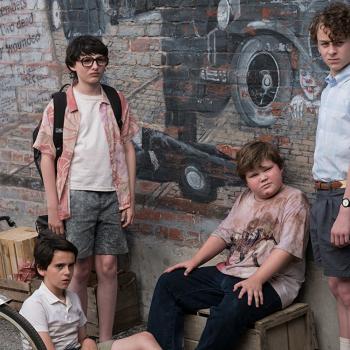I’m a person who likes to know the answers. When someone cries on my shoulder, I jump to wanting to practically solve the problem (because I really, really want to help!), even if no solution is immediately available. When I see an error in other people, I want to fix it immediately. When I face a question about my faith, I want the immediate answer to it, so I don’t have to sit with the discomfort. Sitting with discomfort is hard for me, as it is for a lot of people. But we are in a time with complex problems, and pat answers are not going to save the day. Easy solutions are not available.
This too is like the work of grief–two steps forward, one step back. One moment you are unable to see how you can possibly go on, and the next moment you are able to laugh and smile. One moment you are unspeakably angry, and the next moment you can rest. I feel like an alien in the evangelical Church. Even though I know theoretically and even experientially there are many like me who are also appalled and brokenhearted, it seems as though the numbers of those who bow the knee to Baal are greater still. Good is called evil, and evil good. I have cycled through the stages of grief. Denial that things were as bad as they are. Anger … so much anger. The bargaining of trying to reason people out of these grievous errors. A depression so deep and dark. If I’m honest, I don’t accept this reality. Maybe I need to accept that people are in error and that that is reality, though it is wrong (“God, grant me the serenity”), but I am still cycling through the other stages.
Grief can be a violent process if not entered into with care, and so Anderson’s beautiful image of unsnagging a delicate string of pearls is particularly apt. In the midst of this process, we must be gentle with ourselves. While seeking to extricate ourselves from error, we must be careful not to extricate ourselves from truth. While struggling with the things we do not understand, we must hold on to the things we do know, and ultimately, we must be held on to by those things–and by their Giver, Christ himself.
To use another metaphor, after the earthquake, the ground is slowly settling beneath my feet. I cling to the Apostles Creed, to the Scriptures, to the history of the early church, as everything shakes all around me. I cling, first and foremost, to Jesus Christ. He knows that my sins and errors are great as well. I cling to my life verse, “Lord, to whom shall we go? You have the words of eternal life” (John 6:68 NIV). I cling to Jesus’s promise: “My sheep listen to my voice; I know them, and they follow me. I give them eternal life, and they shall never perish; no one will snatch them out of my hands” (John 10:27-28 NIV).
The shaking and turbulence will calm down eventually. We will find a new normal. Until that time, I seek out other like-minded believers. I pray and seek God. I cry out for justice. I ask that God help me grieve more than rage. I lean into the painful, delicate process.
(NOTE 1: This paragraph originally did not credit Kubler-Ross with the idea that the stages of grief are not sequential. I appreciate the comment and correction by Ken Ross and have made a change in the text. Here is his comment: “We are constantly amazed and frustrated to see people writing about the ‘Kubler-Ross 5 stages of loss/grief/death’ and follow it up with statements such as your ‘Many have observed that these stages do not move sequentially but in a circular fashion; we might move in and out of them in no particular order and with varied frequency.’ – This is what Kubler-Ross said back in 1969 but it is constantly misreported by the media. Dr. Kubler-Ross clearly stated the ‘stages’ do not necessarily go in order, are skipped, sometimes do not happen at all. She said ‘people are not robots and everyone’s grief is unique.’ She would also completely agree with you that we do not ‘get over’ grief, we merely learn to live with it. Thank you for sharing your article and continuing this important conversation. Ken Ross for The Elisabeth Kubler-Ross Foundation”)
(NOTE: My reference to Fox News as a discipling influence on Christians also owes a debt to comments made by Kaitlyn Schiess in an article by Molly Worthen in the New York Times:
To Ms. Schiess, this is one more sign that a new ritual has superseded Sunday worship and weeknight Bible studies: a profane devotional practice, with immense power to shape evangelicals’ beliefs. This “liturgy” is the nightly consumption of conservative cable news. Liberals love to complain about conservatives’ steady diet of misinformation through partisan media, but Ms. Schiess’s complaint is more profound: Sean Hannity and Tucker Carlson aren’t just purveyors of distorted news, but high priests of a false religion.
“The reason Fox News is so formative is that it’s this repetitive, almost ritualistic thing that people do every night,” Ms. Schiess told me. “It forms in them particular fears and desires, an idea of America. This is convincing on a less than logical level, and the church is not communicating to them in that same way.”)
Photo source: “Weeping of the field,” Broo_am (Andy B), via Flickr. License.












